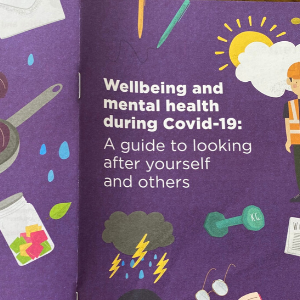
Over 1.3 million households across the North East and North Cumbria will soon receive a booklet through their letterbox, developed by the North East and North Cumbria Suicide Prevention Network with support from CNTW, offering advice to help those struggling to cope with the current crisis.
Lauren, a Peer Supporter for CNTW in Newcastle, shared her thoughts on how the booklet will help people like her and those she supports:
“The distribution of this booklet to households across the North East and North Cumbria is a fantastic way to promote wellbeing during the pandemic. The time that we are living through is unlike anything before, and presents a risk to lots of peoples’ mental health. The Suicide Prevention Network’s booklet is a great way to try and combat this. It’s clear and concise, and gives practical advice on how to cope.
“It covers everything from how to adapt to working from home, to dealing with suicidal thoughts. Many people are feeling alone, isolated and scared at this time, especially if they are shielding. The distribution of this booklet will give them reassurance that they aren’t alone, and will validate their feelings.
“One of the sections in the booklet covers children’s wellbeing. This is so important – their whole routine has been changed and they are bound to be feeling unsettled. It gives advice for parents on how to talk to children and young people about the situation and manage their anxieties. This pandemic has the potential to lead to a rise in mental health struggles in children and young people, so highlighting it within the booklet hopefully pre-empts that by giving parents and carers advice on how to support young people.
“The booklet also offers advice on how to spot the signs that someone else may be struggling, and how to offer them help. The listening tips it gives are especially important in supporting someone who is struggling with their mental health.
“For the people I meet within my Peer Supporter role, Covid-19 has changed the way they can access support, with face-to-face sessions often being replaced with telephone contact. The distribution of this booklet will reassure them that they haven’t been forgotten by services.
“The booklet also offers a blank wellbeing plan to fill in, which is a practical activity that the whole household can get involved with.
“It promotes creating a routine which is crucial for maintaining good mental health. It also has a section to help identify when things might be becoming more difficult, and what practical steps the person can take to help themselves. This is empowering for the individual, helping them take control of their day to day life – something that can often feel out of reach when you suffer from a mental health condition.
“Perhaps the most important part of the booklet is the information around suicidal thoughts, and how to support others who may be in a mental health crisis. This booklet does an amazing job of reducing the stigma around self-harm and having suicidal thoughts. It offers information for family members, friends and carers on how to spot the signs that someone may be experiencing these thoughts. It is important to reduce the stigma; so many people feel ashamed and embarrassed for having thoughts like these, and are scared to discuss them. But talking about these thoughts with someone actually reduces the likelihood of that person acting on them, as they don’t feel as alone. There are also a list of helplines and other services that can be contacted for extra support, especially helpful for those individuals who are self-isolating or live on their own.
“This booklet will have a positive effect on all that receive it, as it offers advice, reassurance and support in a time of great uncertainty.”
You can read more about the Suicide Prevention Network’s distribution of this booklet, and visit their website for more resources.
